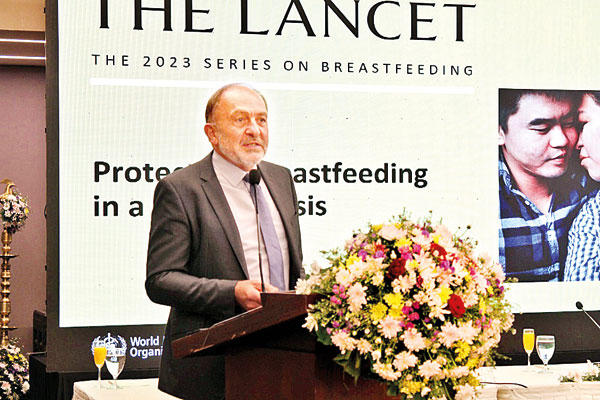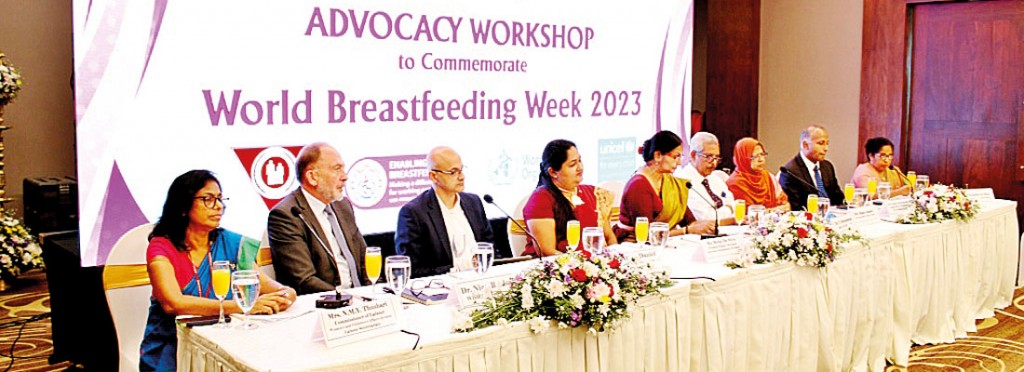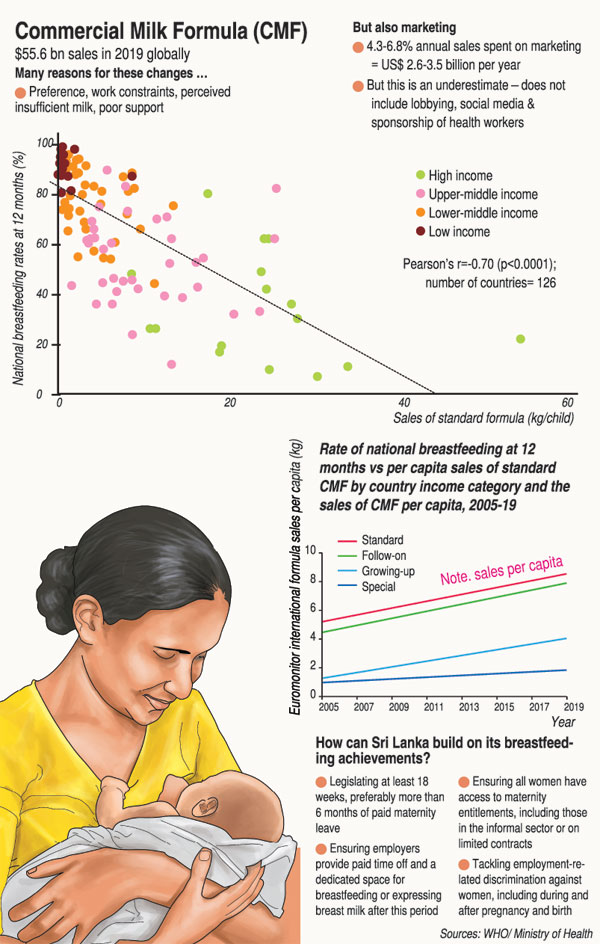News
Alert on insidious efforts of commercial milk formula companies
View(s):- Importance of breastfeeding for both mother and child underscored
By Kumudini Hettiarachchi
While all the speakers stressed how strong evidence pointed to the huge benefits of breastfeeding not only to little ones but also their mothers, the discussions also centred round whether the facilities provided for Sri Lankan mothers were adequate.
Another matter discussed at length was the insidious inroads being made by formula milk companies to influence mothers using advertising gimmicks as well as healthcare personnel including doctors with sponsorships and other perks.

The Director-General of Health Services, Dr. Asela Gunawardena addressing the workshop
Some of the issued looked at taking into account that breastfeeding is an art that needs to be learnt were:
Are the 81 days of maternity leave adequate with the requirement that a newborn should be breastfed exclusively for six months?
What of certain mothers, like those in the estate sector, who opt to go back to work early after childbirth, as they need to eke out a living?
Even though Sri Lanka has an exceptional primary healthcare service with expectant women and mothers with newborns coming under its shelter with regular midwife-visits to homes and a network of vibrant maternal and child health (MCH) clinics, what of those mothers in urban areas who may not be accessing the government sector?
These were discussed at an ‘Advocacy Workshop to Commemorate World Breastfeeding Week’ held on August 14 on the theme ‘Enabling breastfeeding: making a difference for working parents’. High level Health Ministry officials including the Director-General of Health Services, Dr. Asela Gunawardena, state hospital directors and two international experts participated in the workshop.
“Infant feeding matters and breastfeeding is crucially important,” stressed World Health Organization (WHO) expert, Dr. Nigel Rollins, pointing out that the evidence on how it impacts human biology, lifelong health and development, maternal health and child survival is “strong”.
Dr. Rollins of the Department of Maternal, Newborn, Child & Adolescent Health and Ageing at WHO Headquarters in Switzerland not only addressed ‘Protecting breastfeeding in a time of crisis’ but also drew attention to how breastfeeding is challenged in a market-driven world with ‘Marketing of commercial milk formula (CMF) – a system to capture parents, communities, science and policy’.
“Breastfeeding success is a collective responsibility that depends on multifaceted policy and societal responses – it is not the ‘sole’ responsibility of women,” reiterated Dr. Rollins, explaining that infant behaviours such as sleeping and crying, have normal trajectories and can be misinterpreted as hunger etc., or re-framed by companies selling CMF, as ‘abnormal’ to promote artificial solutions.

WHO’s Dr. Nigel Rollins making his powerful presentation
He pointed out that ‘self-reported insufficient milk’ is the reason given by 45% of mothers globally for introducing CMF before 6 months and a third of mothers for stopping breastfeeding. Effective counselling and support help parents understand infant cues and improve effective breastfeeding and breast milk production
“There are many constraints if a woman decides she wants to breastfeed. Therefore, it is the responsibility of governments to implement structural interventions/policies to support breastfeeding and mitigate negative, undermining influences. The terminology itself is an issue – naming ‘commercial milk formula’ as a ‘breast-milk substitute’ conveys the notion of equivalence (being equal),” he said.
Next Dr. Rollins who is also a Paediatrician looked at the ‘modus operandi’ of companies selling CMF and their ‘power’ which is concentrated and highly profitable.
Abbott, Danone, Feihe, Friesland Campina, Nestlé and Reckitt (including Mead Johnson) in 2021 collectively controlled 60% of CMF sales
Research points to profit margins in excess of 20%
The industry also takes the lead, warned Dr. Rollins, in sponsoring or supporting health personnel including doctors or funding ‘learning hubs’ for pharmacists. Sixty percent of paediatric associations worldwide with a website documented receipt of some kind of financial support from CMF companies.
He further warned that health workers and their associations are used as ‘entry points’ by these CMF companies for sponsorships, research and guideline groups because “we are thought leaders and ‘influencers’ and thus become high value targets for industry and its marketing approaches and….……we are susceptible”. The incentives given to health professionals included commissions from sales, ambassadorial roles, funding for research, merchandise, gifts and paid promotional trips
Urging that individually and as professional associations, “we need to put in place measures to constrain the influence of industry”, he underscored that “we also need to work with government – health, trade, justice, labour – to develop, implement and monitor effective legislation to stop unethical marketing practices”.
“The economic power of these companies, in turn, permits a powerful and sophisticated political strategy, with the two faces of corporate power: ‘Public facing’ – benevolent and socially-responsible and ‘Hidden’ – intended to co-opt opponents, undermine the ‘International Code of Marketing’ for CMF and curtail public-interest regulation,” said Dr. Rollins, adding that systematic reviews, case studies and analyses of public access information demonstrate among other issues that the Code is blocked, reinterpreted, circumvented and ignored.

The panel discussion moderated by the Deputy Director General (DDG Public Health Service II) Dr. Susie Perera. From the right are: The Director of Maternal & Child Health, Dr. Chithramalee de Silva; the Vice President of the Sri Lanka College of Paediatricians, Prof. Pujitha Wickramasinghe; the Health Ministry’s Chief Legal Officer Riaza Ahamed; the Acting DDG (Environmental and Occupational Health and Food Safety), Dr. T. Siriwardena; Dr. Susie Perera; the President of the Women’s Section of the Sarvodaya Shramadana Movement, Menu de Silva; UNICEF Sri Lanka Office Health & Nutrition Manager, Dr. Abner Daniel; WHO’s Dr. Nigel Rollins; and the Commissioner of Labour, Women’s and Children’s Affairs Division, Labour Secretariat, N.M.Y. Thushari.
| How SL can go forward, building on its achievements While patting Sri Lanka on the back, WHO expert Dr. Nigel Rollins suggested further improvements by underscoring that “if you are not going forward, you will go backwards”. Sri Lanka’s data for 2016 showed that there was 90% early initiation of breastfeeding; there was 81% exclusive breastfeeding; and 83% continued breastfeeding. According to Dr. Rollins while informing and educating health workers and families are important, it is not enough. There is a need for maternity protection in all work sectors. Commending the country’s regulatory response to marketing, he however asked whether meaningful sanctions have ever been imposed and urged more resources to monitor and implement regulations. | |

The best way to say that you found the home of your dreams is by finding it on Hitad.lk. We have listings for apartments for sale or rent in Sri Lanka, no matter what locale you're looking for! Whether you live in Colombo, Galle, Kandy, Matara, Jaffna and more - we've got them all!

